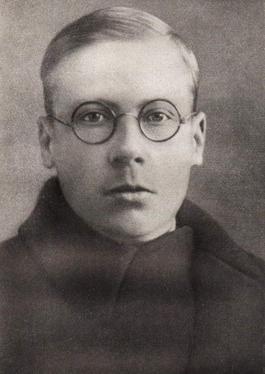Nikolay Zabolotsky facts for kids
Quick facts for kids
Nikolay Zabolotsky
|
|
|---|---|
 |
|
| Born | Nikolay Alekseyevich Zabolotsky May 7, 1903 Kazan, Kazan Governorate, Russian Empire |
| Died | October 14, 1958 (aged 55) Moscow, RSFSR, Soviet Union |
| Occupation | Poet, translator |
Nikolay Alekseyevich Zabolotsky (May 7, 1903 – October 14, 1958) was an important Russian poet and translator. He wrote many poems and translated works from other languages. His life and writing changed a lot over time, especially during a difficult period in Soviet history.
Contents
Who Was Nikolay Zabolotsky?
Nikolay Alekseyevich Zabolotsky was born on May 7, 1903. His birthplace was a small village called Kizicheskaya sloboda, which is now part of the city of Kazan. He spent his early years in towns like Sernur and Urzhum.
Early Life and Education
In 1920, Zabolotsky moved to Moscow. He started studying both medicine and the study of language and literature at Moscow State University. A year later, he moved to Petrograd (now Saint Petersburg). There, he joined the Leningrad State Pedagogical Institute, which was a teaching institute.
Starting His Poetic Journey
Nikolay Zabolotsky began writing poetry when he was young. His early poems were influenced by an art movement called Russian Futurism. Famous poets like Vladimir Mayakovsky and Velimir Khlebnikov were part of this movement. He also admired the lyrical poems of Alexander Blok and Sergei Yesenin. During this time, Zabolotsky met E.V. Klykova, who would become his wife.
In 1928, Zabolotsky helped start an art group called Oberiu. Other members included Daniil Kharms and Alexander Vvedensky. The group's name meant "The Association of Real Art." Around this time, Zabolotsky's poems started to be published.
His first book of poems, Columns, came out in 1929. It featured funny and sometimes strange poems about life during a time called the New Economic Policy. One poem from this book, "The Signs of the Zodiac Fade," later became a popular Russian song.
Changes in His Writing Style
In 1937, Zabolotsky published his second book of poetry. The poems in this collection were different from his first book. They focused more on nature and deep thoughts, rather than social issues. This book also explored ideas of Pantheism. This is a belief that God is in everything and everywhere in nature.
Zabolotsky's poetry also touched on religious themes. These ideas came from his early religious training. They showed the traditional beliefs of people in the countryside before the revolution. Even though official stories tried to show him as a simple Soviet poet, his works had much deeper spiritual and intellectual meanings. By the 1930s, Zabolotsky changed his writing style. He tried to fit in with the official art style called "socialist realism." This was a way to make sure his work was seen as acceptable by the government.
Difficult Times and Exile
During a time of strict government control under Joseph Stalin, Zabolotsky faced serious trouble. In 1938, he was arrested. He was accused of being part of a plan against the government with other writers. He was then sent away to Siberia for five years. His time there was extended until after the war. In 1944, he was released from strict guard but still had to live in exile in Karaganda.
While in Siberia, he continued to write and work. He spent time translating an old Russian epic poem called The Tale of Igor's Campaign. He was finally allowed to return home in 1945.
Return to Writing and Later Years
When Zabolotsky returned to Moscow in 1946, he was welcomed back into the Union of Soviet Writers. He also translated many poems from the Georgian language. These included a famous epic poem called The Knight in the Panther's Skin by Shota Rustaveli. He also translated works by more modern Georgian poets. Because of this work, he often traveled to Georgia.
Zabolotsky also started writing his own poems again. However, his writing style changed a lot after his exile. His later poems became more traditional and classic in form. They were often compared to the work of another famous Russian poet, Tyutchev.
The last few years of Zabolotsky's life were difficult due to illness. He had a serious heart attack. From 1956 onwards, he spent much of his time recovering in the town of Tarusa. He had a second heart attack on October 14, 1958, in Moscow, which sadly ended his life.
 | Kyle Baker |
 | Joseph Yoakum |
 | Laura Wheeler Waring |
 | Henry Ossawa Tanner |

